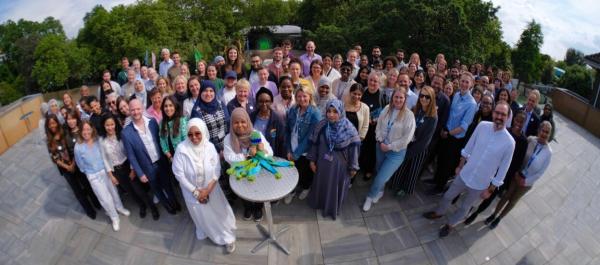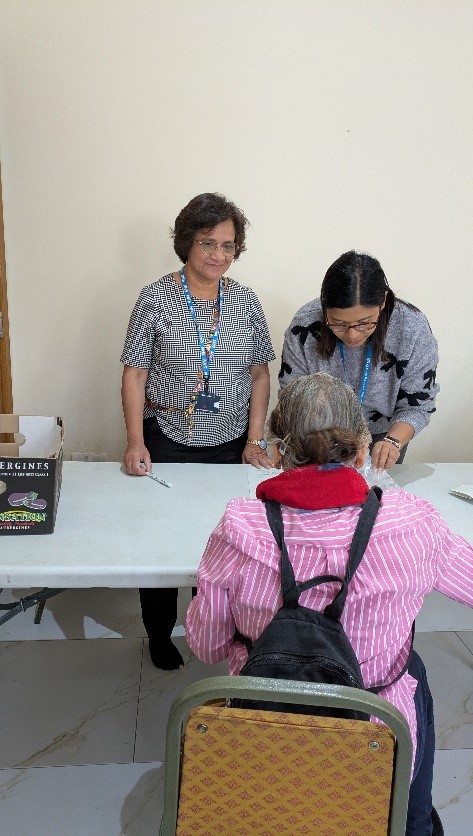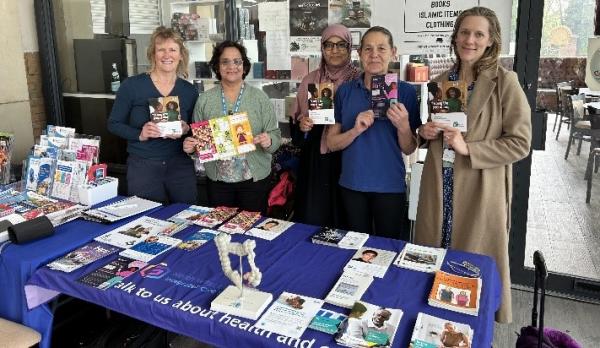|
NW London System Update: May/June 2025
|
|
|
|
Foreword
A message from Rob Hurd CEO
Welcome to our May/June update.
While work continues on changes to our operating model at national and local level, we are maintaining focus on the local priorities set out in our Joint Forward Plan. We have agreed six-system wide priorities for the next year and all parts of the system continue to work towards them.
Neighbourhood health will be a key element of how health services are delivered in future and ICBs will be expected to commission neighbourhood health services from providers, who will be responsible for implementing the teams and new ways of working to deliver care to our residents. It is great to be able to point to a couple of great examples of work already underway in this area in north west London.
Another positive development is the procurement of our peer-led support service for autistic and ADHD children and young people and their families and our success in exceeding the delivery of annual health checks for people with a learning disability. As with other services, it is important that we listen to and understand the needs of these communities and I am proud that public involvement continues to be central to what we do in north west London.
In terms of changes to ICBs, we have now submitted a template setting out a high level summary of our future approach, as required of all ICBs. The detailed work to work out what the model ICB blueprint means for NHS North West London is at an early stage, though we have an ambitious national timetable. I wrote to partners this week to set out where we have got to and we will continue to keep you informed as things develop.
|
|
|
While the has been a good deal of attention on national changes to ICBs, providers and NHS England, it is important to maintain our focus on delivering our Joint Forward Plan, which is now published on our website having been discussed with all our local Health and Wellbeing Boards and at the ICB Board. In May, our Board again noted the importance of involving and consulting local people appropriately on our plans. The ICS Leadership has agreed six broad priorities for the year ahead and these are listed below.
- Reducing unwarranted variation in GP referrals: focus on minimising unnecessary variations in GP referrals to secondary care.
- Refocusing advice and guidance: improve the efficiency and focus of advice and guidance services.
- Contract Management: utilise AI technologies and other tools to streamline the monitoring of contracts, allowing for better focus on key issues.
- Primary care prescribing and medicines management: continue the good work from last year's financial recovery plan to ensure effective primary care prescribing and medicines management.
- Mental Health Investment Standard: maintain focus on the mental health programme and investment standard amidst other priorities.
- Single patient tracking list (PTL) and referral centre priority: work on improving waiting lists and access times to meet targets.
|
|
|
Neighbourhood health is a key focus of the new ICS model blueprint and ICBs will be expected to commission neighbourhood teams as part of the new working arrangements. We have some great examples of good neighbourhood working to build on. The ‘Octopus’ model is an ambitious and collaborative transformational initiative designed to drive systemic change within Westminster's health and social care framework. The primary objective is to foster a more relational and compassionate environment, thereby enhancing the overall patient experience. The model aims to improve access to health and social care services for all residents, with a particular focus on those living in deprived areas where socio-economic factors such as inadequate housing and long-term unemployment significantly impact health and well-being. The initiative seeks to reduce morbidity and mortality rates associated with vascular diseases and cancer. A key component of the Octopus model is the "Just Listening" initiative, which trains individuals to provide empathetic listening support. This model aims to strengthen community interactions by promoting relational and compassionate practices. Approximately 250 individuals have been trained, with plans to expand this training to 2000 individuals across Westminster through a "train the trainer" model. This initiative is part of a broader effort to integrate community health and wellbeing workers into the system, ultimately aiming to improve overall community health outcomes. Quarterly Octopus workshops are held where connectors and other frontline staff get together to share ideas and thinking. The most recent happened at ZSL London Zoo (see below). Please also take a look at our Octopus website which sets out the programme’s ambition and how you can get involved.  The Central Integrated Neighbourhood Team (INT) in Harrow will be working closely with Citizens Advice to help local patients to manage the wider social determinates of health. Local practices will be able to directly referral from primary care into the Citizens Advice service. This model includes an appointment system where patients can be booked in to a qualified adviser within a week and receive timely advice to access benefits and local services. The benefits of the programme include:
- quicker access - residents receive faster welfare advice, addressing need sooner, and getting residents the support and help they require in a timelier manner.
- Accessibility - services located within GP practices make it easier for patients to attend appointments within the INT footprint.
- multilingual service - offering advice in multiple languages to cater to diverse communities
- closer collaboration - enhanced working relationships between welfare advisers, primary care and the wider INT
- training opportunities - GP practices and INTs receive training on welfare issues.
|
|
|
Improving experiences of residents with mental health, learning disabilities, autism and/or neurodiversity
|
|
Following an open procurement process, NHS North West London has awarded the contract for the provision of a peer-led support service for autistic and ADHD children and young people and their families to the Centre for ADHD and Autism Support. The service which is currently being mobilised in a phased manner across our eight boroughs will provide a combination of training, drop-ins and 1:1 post diagnostic support for children and young, as well as their families, to enable them to wait well and understand what their diagnosis means for them.
NHS North West London will receive £242,000 from the Department for Education to support wider roll out of the Partnerships for Inclusion of Neurodiversity in Schools (PINS) programme in 2025/26. The scheme will bring together health and education workforces and parent carer forums to shape whole school SEND provision and upskill staff so they can support neurodivergent children to thrive at school.
The funding will be utilised to deliver targeted interventions to 30 additional mainstream primary schools across Brent, Harrow, Hillingdon and Westminster and to work with the 40 schools that participated in 2024/25 to embed the learning and practice improvements. Participating schools will complete a self-assessment to identify their strengths and key areas for development to inform the interventions to be commissioned from a menu of support e.g. environmental and communication audits, sessional input from SEND advisory services, educational psychologists, speech and language and occupational Therapy, as well as accredited training delivered by autism support teams.
NHS North West London is celebrating success in exceeding the national target (75%) for the delivery of annual health checks for people with a learning disability in 2024/25 with 84% of our eligible population receiving a health check during this period. North West London ICS will be co-delivering a webinar with people with a learning disability on 5 June 2025 aimed at clinical and non-clinical staff within primary care. The session will focus on improving the quality and impact of health checks and provide valuable insight from people with a learning disability who will share their views on what good looks like.
|
|
|
Engaging with our communities
|
The latest communications and involvement summary for April is now available, showcasing how we continue to engage meaningfully with residents across all boroughs. This month’s highlights include the Brent Health Bus event, which reached more than 100 residents with free health checks, screenings, and mental health support in a vibrant community setting. In Hillingdon, NHS teams strengthened relationships with local faith and community leaders at the ‘Let’s Get Together’ event, celebrating faith and diversity through youth-led film projects. Meanwhile, in Hammersmith and Fulham, conversations with young Black heritage mothers at the Nourish Hub focused on improving understanding of childhood immunisations, while Hounslow delivered tailored health information sessions to more than 400 residents across two faith centres Our virtual Residents’ Forum on 4 June 2025 was led by our Acting Chair, Anita Charlesworth, with support from Rob Hurd, CEO, Rachel Christie, population health analyst and Juliet Brown, director of organisation design. Residents discussed the developing North West London health needs assessment and the impact of upcoming changes to ICBs. |
|
|
Raising awareness and making our communities healthier
|
 On 22 May 2025, NHS North West London’s Involvement Team delivered another successful faith centre community outreach session, this time at the Lakshmi Narayan Hindu Temple in Hounslow. In collaboration with key local partners, the session offered a range of core health services aligned to both system-wide and local Hounslow health priorities, a prime example of integrated working from system to place to neighbourhood. Collaborative delivery included:
- Health Outreach Team (HOT) – Blood pressure checks and health promotion
- Imperial College Healthcare NHS Trust – Diagnostic testing for chronic kidney disease
- Children and Young People Immunisations Coordinator – NHS North West London
- NHS North West London Roving Team – MECC health promotion and blood sugar testing.
Working closely with the temple’s management committee, the event focused on conditions of particular concern to the congregation, notably renal health, hypertension, and diabetes. There were over 200 attendees with 123 blood pressure checks undertaken! Some also undertook blood sugar and kidney function tests. Plans are in motion to build on this momentum, incorporating resident feedback and expanding these outreach events across other faith centres in Hounslow. This work highlights the strength of community-centric engagement and the power of integrated teams in bringing health services closer to where people live and worship. Early cancer detection saves lives—and Hounslow’s Public Health team is making it a priority by boosting awareness and screening uptake across the borough. Aligned with the NHS Core20PLUS5 approach, the team aims to improve early diagnosis rates and reduce health inequalities.  Since 2022, cancer awareness has been embedded across local community engagement. The Health Outreach Team and partners have promoted cervical, breast, bowel, and lung screening through trusted settings like beauty salons, places of worship, workplaces, and housing estates. Special efforts have targeted residents with learning disabilities, ethnic minority communities, and other groups with lower screening uptake. Campaigns have been backed by tailored materials, staff training, and partnerships with charities like Shewise to deliver culturally relevant messaging in multiple languages. 2025 results remain on an upward trajectory since 2022:
- breast screening uptake rose from 57% to 64%
- bowel screening from 60% to 67%
- cervical screening (50–64) from 71% to 76.4%
- lung health check uptake rose from 46% to 52% within six months.
The programme shows how locally-led, culturally sensitive approaches can drive real change, making earlier cancer detection a reality for more of Hounslow’s residents. Find out more. |
|
|
Following several years of planning, consultation and discussions with local residents, work has started on the new Northwood Health Centre in Pinner. A ‘ground-breaking’ ceremony was held on Wednesday 7 May 2025 to mark the start of the £12 million refurbishment of the site, transforming it into a modern health centre. The event was attended by representatives from health, property and construction partners including Emily Curtis, Director of Capital and Infrastructure at the Department of Health and Social Care. Our news story provides further details. |
Developing our new operating model
|
|
|
|
On 30 May, all ICBs were required to submit a template to NHS England setting out their financial modelling and assumptions as we look to develop a new operating model given the significant reduction in ICB budgets.
We are not at this stage proposing any changes to the ICB ‘footprint’ covering eight boroughs and 2.7m people. However, we are exploring opportunities for collaborating with our neighbours in North Central London, including potentially sharing some functions as appropriate.
The template does not include suggested staffing structures as these will need to be developed as part of our new model. It does propose a significant reduction on our Executive team to the CEO and four executive directors covering clinical leadership, strategic commissioning, finance and corporate affairs.
We are seeking clarification in a number of areas, including that the NHS pay award will be funded separately, that the higher cost area supplement (HCAS) will be funded as part of our national allocation and that any redundancies will be nationally funded.
|
|
|
|
Work continues to determine INT requirements and interim plans following changes to the New Hospital Programme. In the interim, Estates are working with primary care and trusts to develop a five year pipeline of estates projects, including handback of no longer required property company estate (e.g. at St Charles Centre for Health & Wellbeing), the delivery of existing inflight projects (e.g. the Northwood and Pinner rebuild project), reviewing opportunities to rationalise unused areas of our corporate estate (for example our corporate office at Marylebone Road), exploring One Public Estate prospects with our local authority partners, and proactively managing expiring property company and primary care leases.
NHS North West London Estates continue to work with estates directors to identify and mitigate the increased risk of infrastructure failure arising from the highest backlog maintenance in the UK (at £769.4m) growing further. This is likely to have an impact on the existing pressure on primary and community services to support delivery via alternative models of care in the community such as INTs and the required pace of delivery necessary to mitigate the risk.
Work progresses with ICS partners to inform local authority Local Plans and their respective Infrastructure Delivery Plans (IDPs). The current boroughs of focus are RBKC, Hillingdon and Hammersmith & Fulham. Community Infrastructure Levy (CIL) bids for Hounslow were submitted in December 2024, with NHS North West London Estates successfully securing £524,000 of additional CIL to support works at Heart of Hounslow, a joint venture with Community Health Partnerships (CHP) and West London NHS Trust.
A review of historic rates reimbursements recovery is underway, led by NHS North West London Estates. This is expected to deliver a significant financial return to NHS North West London, which will be ring-fenced and reinvested back into primary care-related estates initiatives.
Estates projects which have completed or are due to complete in Q1 (25/6) include expansion of primary care and reduction in underutilised space at Grand Union Village (May 2025 - Ealing) and the delivery of a new primary care facility in South Kilburn, which will replace a poor quality residential GP site (June 25 - Brent).
NHS North West London Estates are collaborating with primary care, IT and regional teams to agree and deliver a number of schemes using one-off Utilisation Modernisation Fund (£4.2m) and London Improvement Grant Funding (£1.7m). Site visits are being undertaken across 47 GP practices to determine need and eligibility of funding, conducted by Estates. These funding pots will be used to support conversion of space following digitisation of records activity and increase patient facing capacity across primary care sites. Works will be completed within this financial year.
The North West London ICS Green Plan was endorsed at ICS Leadership and the Strategic Commissioning Committee in May. Work now continues to ensure alignment with Trusts’ individual Green Plans and meet the July submission deadline. A sustainability celebration event, hosted by the regional Greener NHS Programme Team and five London ICB Leads will take place in early June to celebrate all of London’s contributions to date in the sustainability sphere.
|
|
|
|
|